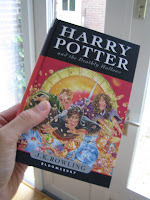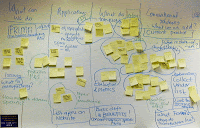Reviewing RSS reader i-Fetch
A fellow blogger asked me to review i-Fetch , a RSS reader by Ideafarms . I took some time to look at iFetch. And compared it to what I'm using: Google Reader . (Disclaimer: again, I didn't use iFetch and using it sometimes changes my impression... ) - Looking at the list of 'Features', my first reaction was: nothing new, nothing that Google Reader, Bloglines , etc can't do. However, after looking more closely i-Fetch does have interesting new stuff (- at least new to me). - "Watch" is interesting. Nice feature. After looking around in Google Reader I found out that they too have it. It's called: "Subscribe as you surf". But it's somewhat hidden, more that in iFetch. - Search in feeds is interesting. Reader doesn't have that. It's a much requested feature... - "Autodiscovery" of feed link is interesting. Didn't know Reader has this too: can be done with, again, "Subscribe as you surf". - The article/post o...












